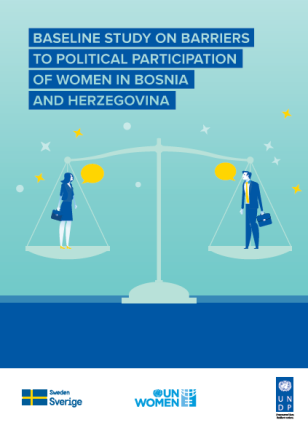Baseline study on barriers to political participation of women in Bosnia and Herzegovina
Baseline study on barriers to political participation of women in Bosnia and Herzegovina
December 6, 2019
The study was developed by the Women in Elections in Bosnia and Herzegovina project, funded by the Government of Sweden and implemented by the United Nations Development Programme (UNDP) in partnership with institutions in BiH.
Equal participation of women and men is at the heart of modern democracy in many countries. In addition to suffrage, the UN Convention on Elimination of All Forms of Discrimination of Women Convention (CEDAW) defines rights of women and men to “participate in the formulation of government policy and the implementation thereof and to hold public office and perform all public functions at all levels of government”. The obligation of state parties of CEDAW to respect, protect and fulfill this right include not only de iure guarantees but also de fact enjoyment of these rights. In Bosnia and Herzegovina, equal representation is one of the central issues of gender equality. It is guaranteed by the Law on Gender Equality and includes an obligation for action if representation of women and men drops below 40%. Globally, women make up slightly more than 50% of the population, yet average only 23.4% of the world’s elected political posts. Underrepresentation of women in elected office has resulted in calls for action to increase the number of women in legislatures by international organisations, treaty bodies and relevant regional organisations. The situation in Bosnia and Herzegovina is not much different and since 1995, women remain the under-represented gender in politics. The situation has not changed after the 2018 General Elections with 21.4% elected women in the Parliamentary Assembly. This result comes despite the Election Law quota for the less represented sex on the list of candidates and despite a number of actions targeting capacity building and promotion of women in politics. This is below the European average of 26.4% and below the 40% threshold of the Law on Gender Equality in BiH, the Council of Europe standards and even below the Beijing benchmark of 30%.
This Baseline study is conducted in the context of the Project “Women in Elections in Bosnia and Herzegovina1”, , which applies two complementary set of activities: 1. Contextualizing and applying the Gender Equality in Elected Office: 6 Step Action Plan to ensure structural changes that provide an enabling environment, legislatively, institutionally and substantively, and 2. Empowerment of women locally to identify, strengthen and nourish the next generation of women leaders.

 Locations
Locations




